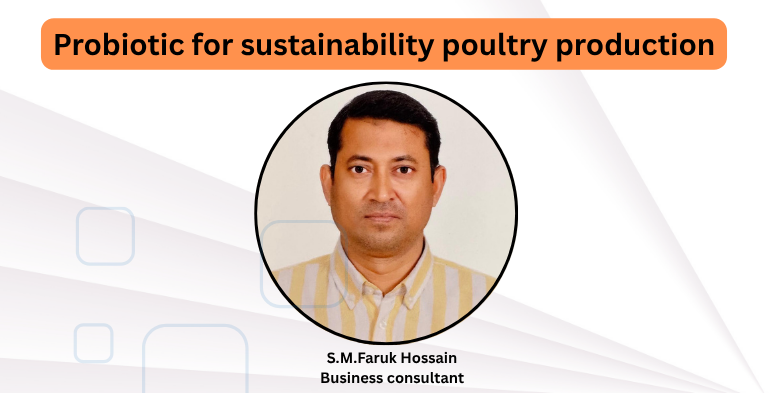
S.M.Faruk Hossain: Probiotics are beneficial bacteria that do some specific functions for sustainable production. It is safe , natural and functional feed additive. Now-a-days Bacillus subtilis and Bacillus lecheniform are effective and widely used probiotics in poultry industry.
Bacillus subtilis plays a vital role in gut health for poultry by acting as a probiotic that enhances digestion, strengthens immunity, and promotes a balanced microbiota. It helps improve intestinal barrier function, increases nutrient absorption, and reduces harmful bacteria like Clostridium perfringens.
Bacillus subtilis helps combat necrotic enteritis (NE) in poultry by improving gut health, reducing inflammation, and inhibiting harmful bacteria like Clostridium perfringens, the primary cause of NE
- Antimicrobial Peptides: subtilis produces bioactive peptides that disrupt bacterial cell walls and inhibit pathogen growth.
- Competitive Exclusion: It outcompetes harmful bacteria for nutrients and space, preventing their colonization.
- Enzyme Production: subtilis secretes enzymes that degrade bacterial biofilms, making pathogens more vulnerable.
- Immune Modulation: It enhances the host immune response, reducing susceptibility to infections.
Bacillus licheniforms is a beneficial probiotic for poultry, known for its role in gut health, nutrient digestion, and immune support. It helps improve digestibility by enhancing enzyme activity, particularly amylase, maltase, and sucrase, which aid in carbohydrate breakdown.
This probiotic also strengthens intestinal integrity, reducing inflammation and supporting tight junction proteins that maintain gut barrier function.
Additionally, B. licheniformis has been linked to better growth performance, antioxidant activity, and immune response in broiler chickens.
- Antimicrobial Peptides: It produces bacteriocins and lipopeptides that disrupt bacterial membranes and biofilms.
- Competitive Exclusion: It outcompetes pathogens for nutrients and space, preventing their colonization.
- Enzyme Production: licheniformis secretes enzymes that degrade bacterial biofilms, making harmful bacteria more vulnerable.
- Organic Acid Production: It generates lactic acid, lowering pH and creating an unfavorable environment for pathogens.
Key concerns include:
- Overuse of antibiotics for growth promotion and disease prevention.
- Development of multidrug-resistant bacteria, making infections harder to treat.
- Impact on food safety, as resistant bacteria can be transmitted to humans.
- Environmental contamination, with antibiotic residues affecting ecosystems.
salient point of beneficial usage of probiotics
Probiotics play a crucial role in poultry health and nutrition. They help improve gut health, enhance nutrient absorption, and strengthen immunity, reducing the need for antibiotics. Specific strains like Bacillus licheniforms and Bacillus subtilis are particularly effective.
Probiotics also mitigate heat stress, improving bird performance. They contribute to better digestion, safeguard gut microflora, and enhance egg and meat quality. With growing concerns over antibiotic resistance, probiotics have emerged as a safe and sustainable
Mitigation of Heat Stress by Probiotics
More recently, probiotics have attracted considerable attention in subsiding oxidative damage caused by heat stress in poultry. Numerous researchers have reported the potential benefits of probiotics in improving gut morphology and integrity in heat-stressed birds.
Bacillus is of industrial importance several reasons, including its excellent safety record, rapid growth rate resulting in short fermentation cycles, and ability to secrete proteins into the extracellular medium. Bacillus-derived peptides have shown to have antifungal, antibacterial, antitumor, antiviral, anti-amoeba, and anti-mycoplasmic activities. Several species of Bacillus, such as Bacillus licheniforms, Bacillus subtilis, Bacillus cereus, and Bacillus clausii, have been used as probiotic supplements in animal diets. A study reported that supplementation of dietary probiotics reduced the negative effects of oxidative stress on semen quality and increased breast meat weight in chronic heat-stressed broilers.
Among aerobic bacterium the Bacillus subtilis is one of the most crucial with beneficial effects on poultry diets by inhibiting the growth of aerobic pathogens, thereby increasing efficiency of dietary protein in poultry. Bacillus subtilis has an enhanced potential to produce exogenous digestive enzymes, enhance intestinal development, improve immune responses and function, improve egg internal quality, and reduce egg yolk cholesterol concentrations. The facultative anaerobic bacterium, Bacillus licheniforms, has a beneficial effect on poultry diets by improving the intestinal absorption surface area and promoting the growth and proliferation of probiotics such as Lactobacillus, Bifidobacterium, and Aspergillus awamori. In studies, Bacillus licheniforms was reported to maintain the goblet cell population in both the ileum and caecum of heat-stressed hens. It is therefore very important to state that supplementation of dietary probiotics may be involved in preventing pathogens, improving nutrient absorption and enhancing immunity, which ultimately translates into improved physical performance and disease resistance in heat-stressed poultry. The example of different types of probiotics and their application in poultry under heat-stressed conditions are shown in Table 1.
|
Probiotic Strains |
Biological Performance under Heat Stress Conditions |
|
Bacillus subtilis |
- Increased the population of Bifidobacterium and Lactobacilli in the gut (3 × 10⁷ CFU/kg) (broiler chicken) |
|
Bacillus licheniforms |
- Restored the impaired villus-crypt structure and maintained normal surface area in the small intestine (laying hens) - Avoided the impairment and regulated the stability of the epithelial intestine (layer chickens) - Reversed the reduced villus height, crypt depth, and surface area structure (broiler chicken) |
|
Probiotic mixture (B. licheniforms, B. subtilis, L. plantarum) |
- Increased beneficial bacterial population Lactobacillus and Bifidobacterium and decreased injurious bacterial population Coliforms in small intestine (broiler chicken) |
|
Probiotic mixture (L. pentosus and L. acidophilus) |
- Increased the population of beneficial bacteria Lactobacillus, Bifidobacterium, Enterococcus (broiler chicken) |
Table 1. Example of different types of probiotics and their application in poultry to ameliorate intestinal morphology under heat-stressed conditions.
Heat stress has emerged as a serious threat to the poultry industry in many poultry-producing countries due to excessive increases in global temperature. Heat stress can affect poultry growth, gastrointestinal health, immune function, production status, and reproductive activity, thereby affecting poultry performance. Probiotics appear promising to mitigate detrimental effects in poultry raised under heat stress conditions, as probiotics can promote gut morphological activities, microbial ecology, physiological function, immune responses, and productivity in birds raised under heat stress conditions.
Writer: Business consultant
























